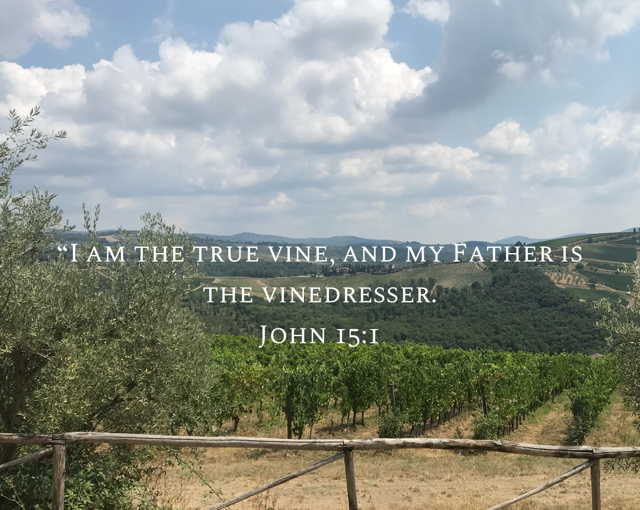
Today’s Reading Ezekiel 31-33; John 11
It’s all about the timing. Every day we are on a time schedule or clock. Trying to make sure that we are on time and leave on time and not falling behind time or being late. Time is one of the major stresses that we have in our daily life. It is interesting that the concept of time that we have currently has been constructed by man not by God. Man has to set limits and boundaries on the passage of time, but God exists in the absence of time.
One of the most profound stories that I can remember about God and time was from a message I heard several years ago. It was in reference to the wedding at Cana, John 2. This was the first miracle of Christ where Jesus makes water into wine. But when you look at the true Manifestation of that miracle, Christ reaches through time to the end product of the wine and brings it to the present. Christ, who is fully human and fully divine, was able to transcend in time and create miracles.
In today’s passage, we see Christ, dealing with time in three different instances: in Lazarus’ sickness, in Lazarus’ death, and Lazarus’ resurrection.
“So the sisters sent to him, saying, “Lord, he whom you love is ill.” But when Jesus heard it he said, “This illness does not lead to death. It is for the glory of God, so that the Son of God may be glorified through it.” Now Jesus loved Martha and her sister and Lazarus. So, when he heard that Lazarus was ill, he stayed two days longer in the place where he was.”
John 11:3-6 ESV
https://bible.com/bible/59/jhn.11.3-5.ESV
In sickness
In sickness, Jesus heard the news that his friend was sick. In other stories of Christ, we have witnessed Jesus speak the word of healing before the messenger is sent, and the person is healed. But in this particular situation, Jesus allows God’s fulfillment of his promises to the people to be shown.
“Then after this he said to the disciples, “Let us go to Judea again.” After saying these things, he said to them, “Our friend Lazarus has fallen asleep, but I go to awaken him.” The disciples said to him, “Lord, if he has fallen asleep, he will recover.” Then Jesus told them plainly, “Lazarus has died, and for your sake I am glad that I was not there, so that you may believe. But let us go to him.””
John 11:7, 11-12, 14-15 ESV
https://bible.com/bible/59/jhn.11.7-14.ESV
In death
The delay for Christ to come to see Lazarus was intentional. Christ knew that Lazarus was dead. But he wanted to allow others to see Lazarus dead and starting to decay. If he had shown up the day that Lazarus died then others could’ve said that he was not fully dead. But when we have this expanded time lapse from when he was sick and he died, it truly shows the full value of Christ’s ability to step into time to bring back the health and the fullness of the body in his time.
“Now when Jesus came, he found that Lazarus had already been in the tomb four days. So when Martha heard that Jesus was coming, she went and met him, but Mary remained seated in the house. Martha said to Jesus, “Lord, if you had been here, my brother would not have died. Now when Mary came to where Jesus was and saw him, she fell at his feet, saying to him, “Lord, if you had been here, my brother would not have died.” Jesus said, “Take away the stone.” Martha, the sister of the dead man, said to him, “Lord, by this time there will be an odor, for he has been dead four days.” So they took away the stone. And Jesus lifted up his eyes and said, “Father, I thank you that you have heard me. I knew that you always hear me, but I said this on account of the people standing around, that they may believe that you sent me.” When he had said these things, he cried out with a loud voice, “Lazarus, come out.” The man who had died came out, his hands and feet bound with linen strips, and his face wrapped with a cloth. Jesus said to them, “Unbind him, and let him go.””
John 11:17, 20-21, 32, 39, 41-44 ESV
https://bible.com/bible/59/jhn.11.17-44.ESV
In resurrection
The resurrection was a miracle that showed God‘s power through Christ. Many of the Jews that were abiding by the law of Moses, and the prophets believed in the resurrection of the dead in the last days. This was relayed by Martha, but Christ is showing that he is the resurrection and the time of renewal is in his hands that was given by God.
Many times in our life, we are going through so many trials and tribulations, and we cannot understand the true manifestation of God in these times. But each point in our journey is governed by God‘s time. Sometimes we have to go through some of the most excruciating circumstances so that the miracle can be shown that it was just through God‘s grace and nothing else. I witness so many miracles in my life that always can be attributed to God. Sometimes I do not like the timing, but He has not failed me in any of his amazing potential and resurrecting power.
Be blessed






